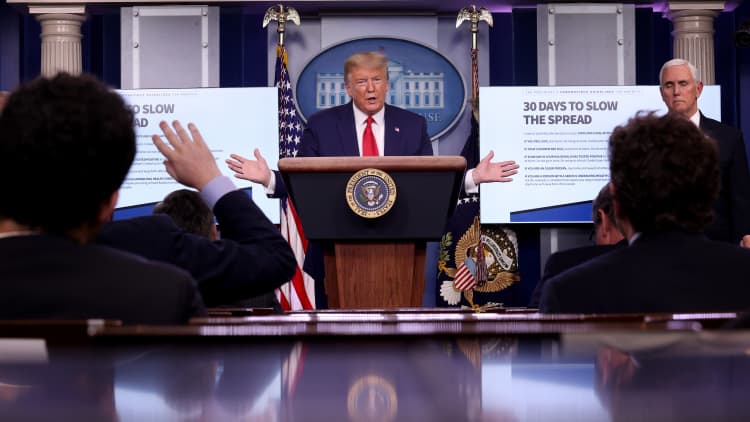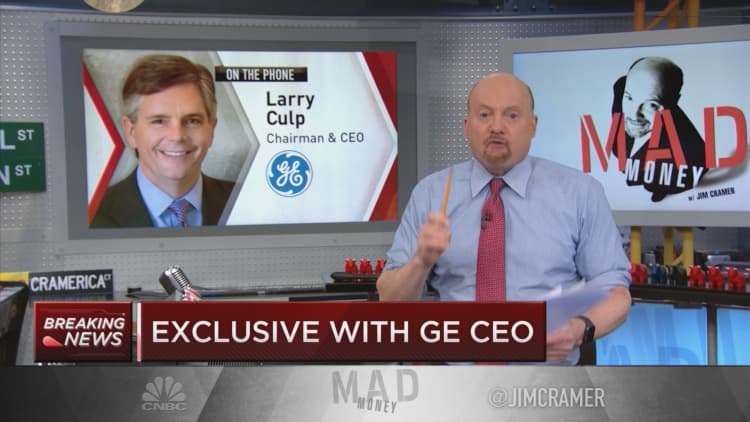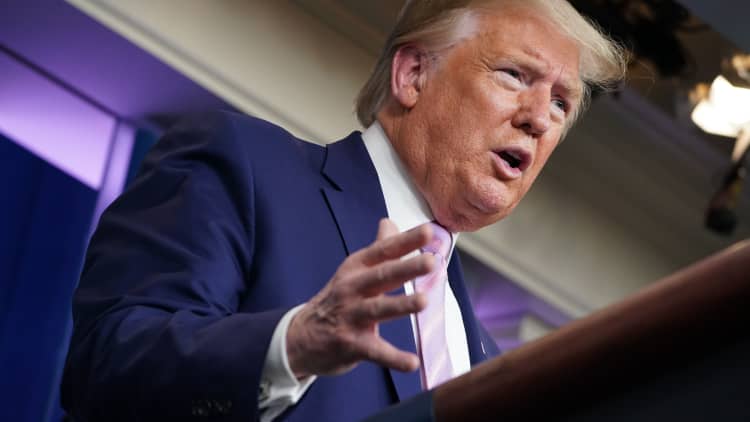President Donald Trump, after much reluctance, has used the powers of the Defense Production Act to compel companies to manufacture items in short supply that would aid in the U.S. response to the deadly coronavirus.
The White House has asked companies to ramp up production of protective gear needed by health professionals on the front lines of the crisis as hospitals, stores and testing centers warn they're experiencing shortages in medical masks, ventilators, gloves, testing swabs and other essential equipment.
Trump said he would invoke the Defense Production Act after mounting pressure from Democratic lawmakers, who sent the president a letter earlier in March urging him to use its powers.
But he put off invoking it, saying in a March 18 tweet that he would only use it "in a worst case scenario."
Meanwhile, U.S. governors had been begging the White House to use the law to send their states much-needed ventilators. New York Gov. Andrew Cuomo has said his state, which has the highest number of confirmed cases in the country, needs 30,000 ventilators to save lives.
The bulk of the companies assisting with emergency supply production were compelled to do so on Thursday, more than two weeks after Trump signed the executive order triggering the Korean War-era law. In a statement, the president said his order would "more fully ensure that domestic manufacturers can produce ventilators needed to save American lives."
"My order to the Secretary of Health and Human Services and the Secretary of Homeland Security will help domestic manufacturers like General Electric, Hill-Rom, Medtronic, ResMed, Royal Philips, and Vyaire Medical secure the supplies they need to build ventilators needed to defeat the virus," the statement continued.
Many of them had already ramped up production.

Here are the companies Trump has called on so far to manufacture emergency supplies:
General Motors
Trump on March 27 ordered auto giant General Motors to make ventilators after criticizing the company for not acting quickly enough to produce the devices.
Prior to Trump's order, the company had already announced plans to build critical-care ventilators with Ventec Life Systems at the automaker's component plants in Kokomo, Indiana.
GM in an emailed statement reiterated that employees with Ventec, GM and their supply base "have been working around the clock for over a week to meet this urgent need."
"Our commitment to build Ventec's high-quality critical care ventilator, VOCSN, has never wavered," GM said. "The partnership between Ventec and GM combines global expertise in manufacturing quality and a joint commitment to safety to give medical professionals and patients access to life-saving technology as rapidly as possible. The entire GM team is proud to support this initiative."
General Electric
The conglomerate was among the six firms Trump included in his Thursday order.
In March, the company announced that its health-care unit is scrambling to increase production of equipment including ventilators, patient monitors, CTs and mobile X-ray devices to meet increasing demand from hospitals and other facilities fighting the pandemic.
Ford Motor Co., which faced pressure from Trump to ramp up production in response to the outbreak, and GE Healthcare announced on Monday that the companies would team up to produce 50,000 ventilators at a facility in Michigan.
Trump in a March 27 tweet urged Ford to "GET GOING ON VENTILATORS, FAST," though so far he has not invoked the DPA against that carmaker.
Production of the critical-care devices is expected to begin with 500 United Auto Workers union members the week of April 20, according to executives at both companies. Ford's Rawsonville Components Plant in Ypsilanti, Michigan, will be able to produce 30,000 ventilators a month after early July, officials said.
Ford and GE expect to produce 1,500 by the end of April, 12,000 by the end of May and 50,000 by July 4, officials said.
"We are really excited and applaud Ford, how quickly it's mobilized its manufacturing facilities to address the challenges we all face with COVID-19," Tom Westrick, vice president and chief quality officer of GE Healthcare, said during a call Monday afternoon with media.
Hill-Rom
Hill-Rom, a company that manufactures health-care equipment such as hospital beds and medical technology, was also included in Trump's order Thursday.
The company, headquartered in Indiana, had already released a statement on March 24 committing to the fight, saying it would ramp up production of non-invasive ventilators and hospital beds.
"We are committed to scaling production as rapidly as we can to meet the challenges the world is facing with COVID-19," said Hill-Rom President and CEO John Groetelaars in the release.
"Hillrom's critical care, vitals monitoring and respiratory products can help caregivers and patients as coronavirus continues to cause severe illness around the world. We are focused on our employees' health and safety, and on ensuring that our products are available when and where our customers and patients need them."
Medtronic
Health-care and biomedical engineering company Medtronic, one of the companies Trump called on Thursday, promised on March 27 that "everything that could be done and should be done is being done."
Executive Vice President and President Bob White said in a series of videos posted on the site that the company has "ramped our ventilator capacity ... up by 40% already."
"We have our teams already up and running both in manufacturing and supply chain, as well these external collaborations," he said. "So I would say the mobilization is full-on, everybody is engaged."
Still, White cautioned that it's going to take time for the company to ramp up production. "It will take a few months for us to even further dramatically increase the production of our ventilators, but we're on that and we're working on it very aggressively," he said.
ResMed
The medical technology company was also included in Trump's directive Thursday. ResMed specializes in the production of ventilators and has 7,500 workers in 140 countries to combat the growing pandemic, according to CEO Michael Farrell.
The company is looking to double or triple production to fight the coronavirus globally, Farrell said Wednesday in an interview on CNBC's "Mad Money." In the United States, ResMed is particularly focusing on ramping up production in New York, California, Washington and Michigan, states that have been hit the hardest by the spread of the disease.

"We're going to double, triple or more our noninvasive ventilators, invasive ventilators, and do more than 10 times the volumes of our ventilation masks," Farrell said, "to take care of COVID-19 patients so we keep them breathing while their own immune systems fight the disease."
"If you break it down to just the ventilators, we made tens of thousands of ventilators last year in 2019. We're gonna do double that and triple that, and we're going to do it in real time."
Royal Philips
Health technology company Royal Philips, another of the six companies, said in a March 22 release that it would increase "the production of certain critical care products and solutions to help diagnose and treat patients with the new coronavirus disease."
"Philips is ramping up the production of hospital ventilators and plans to double production within the next eight weeks and achieve a four-fold increase by the third quarter of 2020," the release said.
"In line with Philips' mission to improve people's lives, we want to help as many healthcare providers as possible to deal with the growing numbers of critical COVID-19 patients," said Frans van Houten, CEO of Royal Philips. "There is an unprecedented global demand for medical equipment to help diagnose and treat patients with COVID-19."
Vyaire Medical
Trump also compelled Vyaire Medical, a company that produces ventilators, face masks, oxygen blenders, resuscitation devices and other respiratory medical equipment, to manufacture products to help in the fight against the coronavirus.
Vyaire began "retooling its manufacturing capacity" to respond to the pandemic in January, according to a press release.
"The company is redeploying engineering resources and seeking to hire additional workforce to accelerate production of ventilators at key manufacturing facilities," the release said. "In addition, the company is exploring potential partnerships with non-medical equipment manufacturers and distribution companies to increase the availability of life-saving equipment and speed access to areas of the country in most critical need."
3M
3M, which was separately compelled on Thursday to "acquire, from any appropriate subsidiary or affiliate of 3M Company, the number of N-95 respirators that the Administrator determines to be appropriate," engaged in a public spat with the president, pointing out that some of Trump's requirements would backfire.
In a statement Friday morning, the company said the Trump administration's request "that 3M cease exporting respirators that we currently manufacture in the United States to the Canadian and Latin American markets" would have "significant humanitarian implications" for health-care workers in those countries, where 3M is a "critical supplier of respirators."
The company also noted that "ceasing all export of respirators produced in the United States would likely cause other countries to retaliate and do the same, as some have already done."
"If that were to occur, the net number of respirators being made available to the United States would actually decrease," 3M added.
The back and forth came after a tweet Thursday night in which Trump claimed that the White House "hit 3M hard today after seeing what they were doing with their Masks."
The company said Friday that it was already working with the Trump administration on getting more masks to the U.S.
"We have been working closely with the Administration to do exactly that, and we appreciate the authorities in the DPA that provide a framework for us to expand even further the work we are doing in response to the global pandemic crisis," 3M said. "We look forward to working with FEMA to implement yesterday's order."

The coronavirus, which is believed to have originated in Wuhan, China, has spread to dozens of countries globally, with more than 1,026,900 confirmed cases worldwide and at least 53,975 deaths so far, according to data from Johns Hopkins University. There are at least 245,500 cases in the United States and at least 6,058 deaths, according to the latest tallies.
— CNBC's Michael Wayland, Christina Wilkie, Leslie Josephs and Kevin Breuninger contributed to this report.


